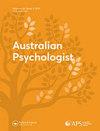情绪控制与接纳信念:与心理困扰的关联及情绪调节灵活性的中介作用
IF 2
4区 心理学
Q2 PSYCHOLOGY, MULTIDISCIPLINARY
引用次数: 2
摘要
摘要目的情绪调节过程模型假设情绪信念影响调节过程,影响心理健康结果。情绪可以被控制的信念(即控制信念,支撑传统认知行为疗法)和被接受的信念(即接受信念,支撑接受和承诺疗法),虽然看起来是对立的,但都与较低的心理困扰有关。本研究验证了情绪调节灵活性(即在适当的时间使用和应用一系列调节策略)可能调解这些信念与痛苦之间的关系的假设。方法177名被试(女性87.6%,年龄42.7岁)完成了21项抑郁、焦虑和压力量表、情绪信念问卷-一般可控性复合问卷,并编制了情绪信念问卷-接受变异问卷和情绪调节灵活性问卷。结果情绪调节灵活性在控制信念和接受信念与痛苦之间起中介作用,更强的控制信念和接受信念通过更高的情绪调节灵活性降低痛苦。结论控制信念和接受信念对心理健康都有帮助,这与理论一致;这些信念可以为控制或接受为基础的情绪调节策略的使用提供信息,如果灵活应用,可能会降低痛苦水平。这些发现讨论了相应的治疗干预措施。(1)情绪调节过程模型假设情绪信念影响情绪调节过程和心理健康结果。(2)控制信念和接受信念虽然看似对立,但都与较低的心理困扰相关。(3)情绪调节灵活性与较低的心理困扰相关。本课题补充的内容:(1)同时拥有高控制和接受信念与通过较高的情绪调节灵活性降低心理困扰相关。(2)灵活转换的信念与较低的心理困扰相关。(3)刚性控制信念与心理困扰无关联,而刚性接受信念与心理困扰有关联。本文章由计算机程序翻译,如有差异,请以英文原文为准。
Control and acceptance beliefs about emotions: associations with psychological distress and the mediating role of emotion regulation flexibility
ABSTRACT Objective The process model of emotion regulation posits beliefs about emotions inform regulation processes, affecting mental-health outcomes. Beliefs that emotions can be controlled (i.e., control beliefs, underpinning traditional Cognitive Behaviour Therapy) and accepted (i.e., acceptance beliefs, underpinning Acceptance and Commitment Therapy), though seemingly opposing, are both associated with lower psychological distress. This study tested the hypothesis that emotion regulation flexibility (i.e., using and applying a range of regulation strategies at the right times) may mediate the relationship between these beliefs and distress. Method 177 participants (87.6% female, Mage = 42.7) completed the 21-item Depression, Anxiety and Stress Scale, the Emotion Belief Questionnaire-General Controllability Composite, and two measures developed for this study: the Emotion Belief Questionnaire-Acceptance Variant and Emotion Regulation Flexibility Questionnaire. Results Emotion regulation flexibility mediated the relationship between control and acceptance beliefs and distress, such that stronger control and acceptance beliefs were associated with lower distress via higher emotion regulation flexibility. Conclusions Our results are consistent with theorising that both control and acceptance beliefs are useful for mental health; these beliefs may inform usage of control or acceptance-based emotion regulation strategies, which may reduce distress levels if applied flexibly. These findings are discussed regarding corresponding therapeutic interventions. Key Points What is already known about this topic: (1) The process model of emotion regulation posits beliefs about emotions inform emotion regulation processes and mental health outcomes. (2) Control and Acceptance beliefs while seemingly opposing are both associated with lower psychological distress. (3) Emotion regulation flexibility is associated with lower psychological distress. What this topic adds: (1) Having both high control and acceptance beliefs is associated with lowered psychological distress via higher emotional regulation flexibility. (2) Flexibly shifting beliefs is associated with lowered psychological distress. (3) Inflexible controls beliefs is not associated with psychological distress, while Inflexible acceptance beliefs is associated with psychological distress.
求助全文
通过发布文献求助,成功后即可免费获取论文全文。
去求助
来源期刊

Australian Psychologist
PSYCHOLOGY, MULTIDISCIPLINARY-
CiteScore
3.70
自引率
5.30%
发文量
32
期刊介绍:
The Australian Psychologist is the official applied practice and public policy journal of the Australian Psychological Society. As such, the journal solicits articles covering current issues in psychology, the science and practice of psychology, and psychology"s contribution to public policy, with particular emphasis on the Australian context. Periodically, Australian Psychological Society documents, including but not limited to, position papers, reports of the Society, ethics information, surveys of the membership, announcements, and selected award addresses may appear in the journal.
 求助内容:
求助内容: 应助结果提醒方式:
应助结果提醒方式:


